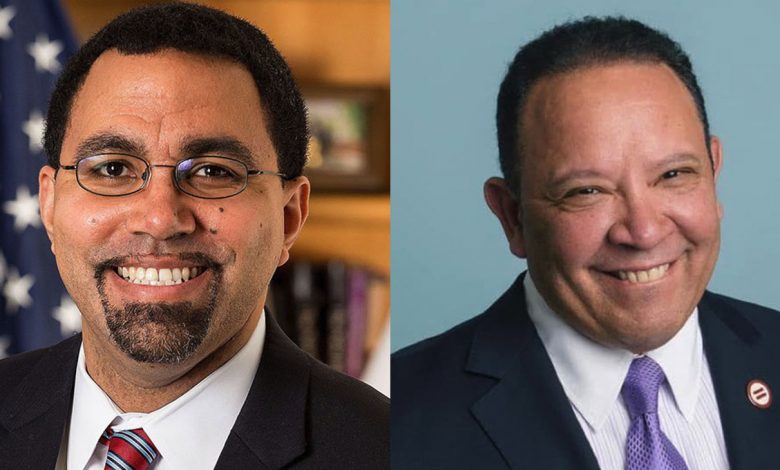
OP-ED: Advocate for a racial justice agenda at the U.S. Department of Education
By John B. King Jr. and Marc Morial
The coronavirus has shined a light on how systematic racism, unequal access to opportunity, and disinvestments in low-income communities and communities of color have compounded inequities that have long existed in our country. Black and Latino Americans, for example, are more likely to be hospitalized with and die of COVID-19, are less likely to have access to quality healthcare, and are experiencing disproportionate and devastating economic instability as a result of the pandemic.
Meanwhile, Black and Latino children are bearing the emotional impact of seeing their communities and families ravaged by the virus and are more likely to encounter challenges with their education—which has largely moved online—due to a lack of access to high-speed internet and devices for learning.
With a new presidential administration, we have an opportunity to begin on the path to a strong recovery from the pandemic. But COVID-19 recovery cannot happen without education recovery. And true education recovery must focus on ensuring every child’s civil right to quality teaching and learning in our nation’s public schools. The federal government—specifically the Biden-Harris administration’s Department of Education—can, and must, play a part in this work, by reinstating its role as a civil rights agency with a robust racial justice agenda.
To be sure, if we want to “build back better,” decisive and bold federal action is required. Historically, there have been times when the Education Department has prioritized its civil rights role to ensure that students—regardless of their race, background, ethnicity, native language, disability, LGBTQ status, housing status, or country of origin—have the opportunity to access a quality public education. But that role was abandoned under the 45th president.
As the Biden-Harris administration prepares to assume office, we believe there are important ways that the Education Department can address the immediate impacts of the COVID-19 crisis, as well as our nation’s ongoing fight against systemic racism and injustice.
First, the Secretary of Education must use his or her platform to lead a nationwide conversation about education through a racial equity lens.
That conversation must center on the needs of students from marginalized communities, clearly illuminate the impacts of the pandemic, and demonstrate how those impacts interact with and exacerbate hundreds of years of systemic racism. That conversation, shaped by the secretary’s national bully pulpit, is critical to nudging our decentralized education system toward greater equity. It must be stewarded by a leader who intentionally creates and maintains space for feedback loops with communities that have been marginalized and most directly impacted by injustice.
Second, the Education Department must use all the levers at its disposal to combat educational inequities that existed prior to, and have been compounded by, the pandemic.
The Department must work with Congress to take immediate action to close the digital divide, invest additional federal resources to address learning loss due to COVID-related disruptions, and incentivize states to revise their funding formulas to make them more equitable so that students with the greatest needs receive the resources that are necessary to succeed in college and careers. Part of this work will entail ensuring that, in places where cuts cannot be avoided, states and school districts are not disproportionately cutting public education funding from the highest-needs schools.
In the early months of 2021, the Biden-Harris administration also will be tasked with proposing a budget and advocating for that budget before Congress. We urge the new administration to hold firm to its promise to invest in programs that help our most underserved students thrive, by tripling funding for Title I; making college more affordable by doubling the maximum Pell Grant; and supporting community colleges, Historically Black Colleges and Universities, and Minority-Serving Institutions.
Importantly, we hope the Department will, along with robust investments, work with Congress to reauthorize the Higher Education Act, a fundamental lever in advancing racial equity and opportunity for today’s students.
Additionally, the Department must immediately strengthen and re-issue prior guidance that supports a racial justice agenda. This includes guidance to states, schools, and institutions of higher education to legally pursue desegregation strategies that increase diversity. This also includes guidance issued by the Departments of Education and Justice related to ensuring that students of color aren’t disproportionately subjected to overly harsh school discipline practices.
The Department also must issue guidance and take appropriate civil rights enforcement actions to ensure that students of color, Native students, English learners, students with disabilities, and students from low-income families have access to the same opportunities and resources as their peers. This includes access to advanced coursework, talented and diverse educators, and safe and supportive school environments.
Finally, almost exactly five years ago, the passage of the Every Student Succeeds Act ushered in a new era that provided states with greater flexibility to meet the needs of their local contexts. While the law provides guardrails that are designed to protect our most marginalized students, it required states to take greater responsibility for ensuring the civil rights of all students are protected.
Unfortunately, and much to the concern of civil rights advocates like us, we’ve seen that the flexibility within the law and the lack of oversight by the current administration—alongside the many failures of the federal government in responding to COVID-19—are widening gaps in access to educational opportunity for marginalized students. The Biden-Harris Education Department must right this wrong.
To do that, the incoming secretary must hold fast to ensuring that educators, families, and communities have accurate information about how students are performing in our K-12 schools, including data from statewide assessments, so that resources can be directed to schools and students in need.
Our communities are seeking the Department of Education’s leadership in fighting against the dual pandemics of COVID-19 and the deep, systemic disparities that threaten to create a second-class education system for students of color. We call upon the Biden-Harris administration to enforce federal education law, champion equitable policies, and implement a racial justice agenda as a sign of its commitment to dismantling the inequities that have denied students of color access to opportunity for far too long.
John B. King Jr. is the president and chief executive of the Education Trust and served as U.S. Secretary of Education under President Obama. Marc Morial is the President and CEO of the National Urban League.










